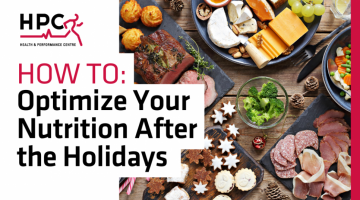Holiday Nutrition Tips: Optimize Your Nutrition After the Holidays

Written by Registered Dietitian Rachel Hannah at the Health & Performance Centre, Guelph ON
The holidays are a wonderful time to enjoy and celebrate food and drink with our loved ones and have our favourite seasonal indulgences. However, getting back to a healthy diet can be a challenge once the holidays are over, especially with all the leftover treats around. As a nutritionist and registered dietitian at the Health and Performance Centre at the University of Guelph, I have a few tips to help you optimize your nutrition after the holiday season.
Develop a process and routine:
First, plan to grocery shop for healthy foods and budget in some time to organize your fridge. Focus your meals and snacks on whole, unprocessed foods like vegetables, fruits, whole grains, and lean proteins. These foods are more nutrient-dense and provide better feelings of satiety, leading to better appetite control throughout the day.
By eating minimally processed foods, you'll get more dietary fibre, which helps with digestion and overall health, and you'll feel more satisfied after meals. Good sources of fibre include fruits, vegetables, whole grains, and legumes.
Try to adopt the 80/20 guideline:
Try to adopt the 80/20 guideline. If ~80% of your food choices come from those mentioned above, the other 20% can be your favourite treats or foods higher in fat.
It is not sustainable to cut out foods we like, but rather focus most of our meals and snacks on these healthy choices. Try to fill half your plate with various non-starchy vegetables like broccoli, cauliflower, asparagus, green beans, peppers to name a few or have a salad to start your meal.
Don't skip protein:
Include protein in each meal and snack (ideally 4-6 times per day). Protein slows down digestion and helps you feel more satisfied after meals. It helps repair and build tissues in the body. Good sources include dairy products, lean meats like chicken, turkey, and lean red meat. Fish, beans, tofu, tempeh, and legumes are other great sources.
Take time to reflect:
Reflect on what you find are your most challenging times of day for eating. Are you snacking every night after dinner? Do you consistently have a mid-afternoon treat when you start to feel tired? Many of our eating behaviours are automatic until we stop to think about them. Consider the times of day when you might be "at risk" for consuming food out of habit instead of true hunger.
Developing new eating behaviours takes time, but it can be done with the help of a trained professional like a registered dietitian.
Try to focus on the healthy behaviours you want to adopt, not the number on a scale. Weight loss is not a behaviour change, but the daily habits we practice are within our control and can greatly improve our health and well-being.
If you're concerned about your eating behaviours or overall nutrition, consider speaking with our Registered Dietitian Rachel Hannah here at the Health & Performance Centre in Guelph. Dietitians are trained to help you improve your nutrition and achieve your health goals.







